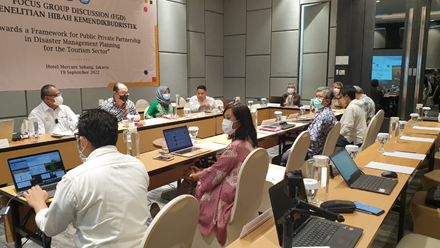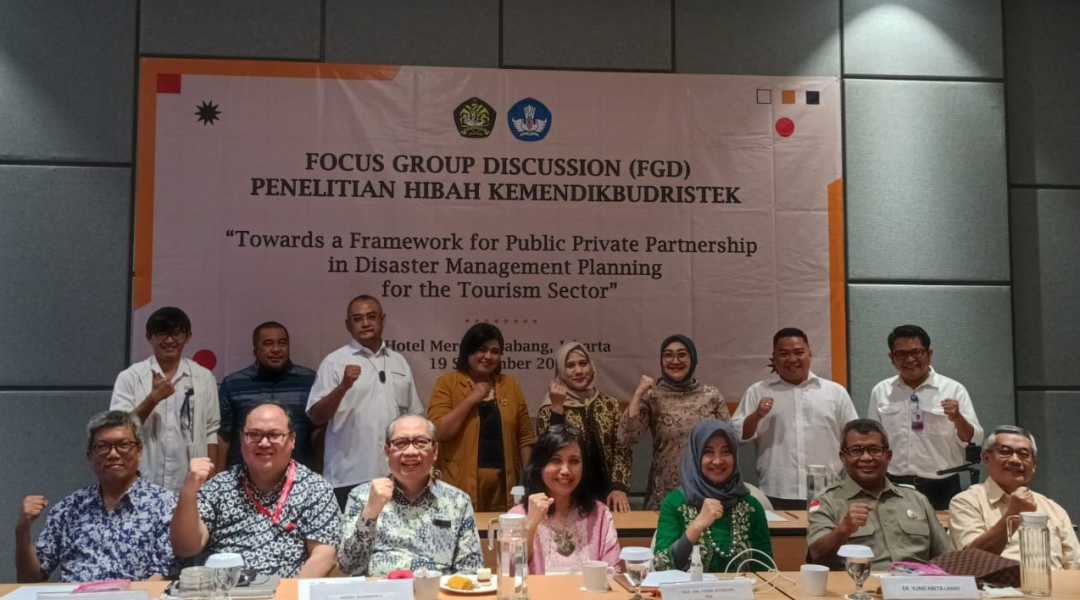By: Devi Kausar, Sarojini Imran, Dini Rosmalia
The research grant from the Ministry of Education and Culture has been running for two years, conducted in the provinces of Yogyakarta and Bali. The research team consisted of the Dean of the Faculty of Tourism, Ms Devi Kausar, PhD., CHE (Team Leader), with members, Dr Ir. Sarojini Imran, M.Si, Head of the Center for Tourism Research and Development (PKP2), Faculty of Tourism and Dr Dini Rosmalia, ST., M.Si, Head of Architecture Study Program, Faculty of Engineering UP, also Dr Agustan as a partner team from BRIN and Prof. Joseph M. Cheer from Wakayama University, Japan.
The purpose of the initial research is to examine the role of tourism industry associations in mitigating disasters that can affect tourism, also to identify factors that influence the success of public-private partnerships (especially between government agencies and tourism industry associations) in disaster management planning and to determine priority strategies for implement partnerships. For this reason, a Focus Group Discussion was held, which invited experts, namely officials from the National Disaster Management Agency (BNPB), Kemenparekraf, UI Disaster Risk Reduction Center, disaster experts, certification experts, representatives of the Indonesian Hotel & Restaurant Association (PHRI), Hotel Indonesia General Managers Association. (IHGMA) and Indonesian Tour Leaders Association (ITLA).
Further research on the tourism industry, in particular through industry associations, can it play an active role in tourism planning & management through public and private partnerships. And in practice, can industry associations cooperate with disaster management agencies and local governments starting from the pre-disaster stage? Public-private partnerships are expected to facilitate post-disaster response and recovery and improve pre-disaster prevention and preparedness.
The results of the discussion show that the disaster-based policies in the Regional Tourism Development Master Plan have not been seen to be running well, so it is necessary to increase the role of associations in disaster education and socialization; Need regulations that complement the completeness of disaster facilities; There needs to be a unique institution to deal with the crisis that is formed permanently and programmed. The Stakeholder should consist of government representatives and tourism industry associations as well as the existence of disaster management guidelines is needed, which are socialized regularly and programmed. This reinforces the need for disaster preparedness certification for tourism industry service providers (especially in Bali) to involve the participation of entrepreneurs in disaster preparedness.
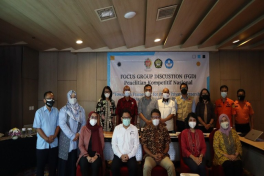
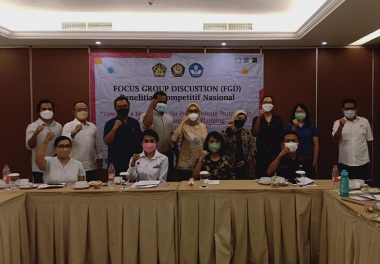
Explore the Disaster Preparedness Certification (SKB) conducted by the Bali Province BPBD as one of the priorities chosen by Bali stakeholders through the process hierarchy analysis (AHP) technique. So in the second year of research, it was carried out in Bali with a focus on preparedness certification by conducting interviews with the Bali BPBD team and hotel managers in Nusa Dua. And also observing the disaster preparedness certification field assessment process carried out by BPBD at the Bali National Golf Club – Nusa Dua. The Bali Province BPBD interviewees included Mr Gede Suardita, Head of the Governor’s Group for Disaster Mitigation and Reduction, and his team: Mr Tresna Budi, Mr Dewa Ketut Sumbawa and Mr Swanjaya. Mr Rio.
Disaster preparedness certification was initiated in 2014 at the initiative of BPBD. The indicators are developed independently by BPBD without exceptional budget support. Certification has been carried out since 2014 and was participated by various hotels and related businesses. In 2020, the certificate was included in the PERDA so disaster preparedness certification (SKB) has been legal since that year. There are four stages in carrying out the accreditation: registration by the business community, filling out self-assessment forms, desk assessments and field assessments by the BPBD team. There are four SKB assessment criteria, namely: 1) Knowledge (13 indicators), 2) Mitigation indicators (15), 3) Preparedness and response capacity (17 indicators) 4) Security (6 indicators). Certification is carried out free of charge and valid for three years.
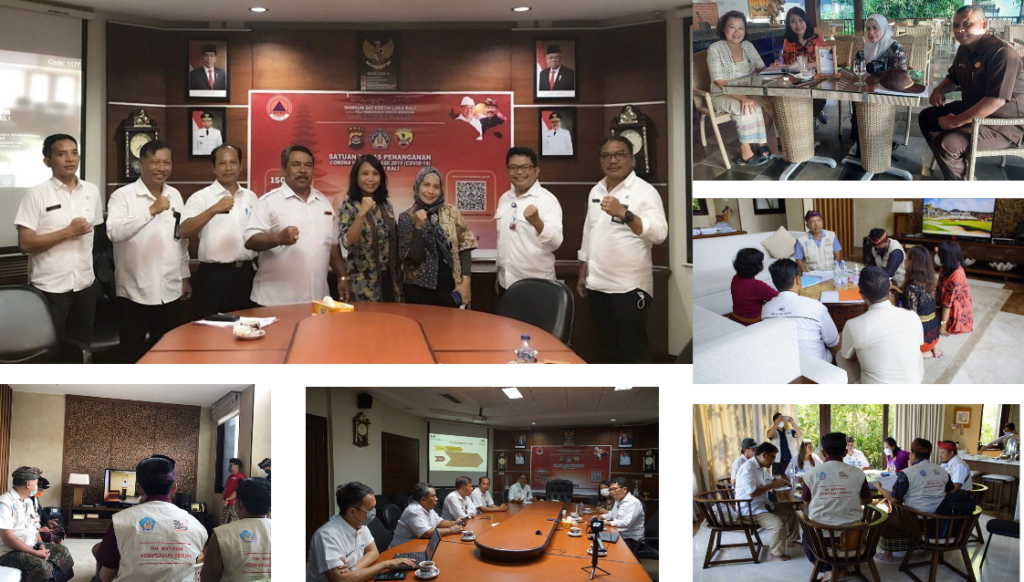
As a continuation of the interview results, on Monday, September 19, 2022, another FGD was held in Jakarta at the Mercure Hotel Sabang, Central Jakarta.
The invited expert team includes:
- Dr Agus Wibowo (Director of Disaster Management Strategy Development – National Disaster Management Agency)
- Danesta (Crisis Management Coordinator representing the Director of Destination Governance – Ministry of Tourism and Creative Economy)
- Dra. Fatma Lestari, MSi., PhD (Director of Disaster Risk Reduction, University of Indonesia)
- Andi Eka Sakya (Disaster Expert)
- Sumarna F. Abdurahman, MSc. (Certification Expert)
- Swasetyo Yulianto (independent disaster data communication expert)
- PT Indonesia Tourism Development Corporation (ITDC)
- Yuno Abeta Lahay (Indonesian Hotel and Restaurant Association – PHRI)
- Braja Eka Sukma, M.Par, CHA, CHIA (Indonesian Hotel General Manager Association – IHGMA)
- Robert Alexander S. Moningka, S.Tr.Par (Indonesia Tour Leaders Association – ITLA)
- Nunung Rusmiati, MSi. (Association of the Indonesian Tours & Travel Agencies – ASITA
